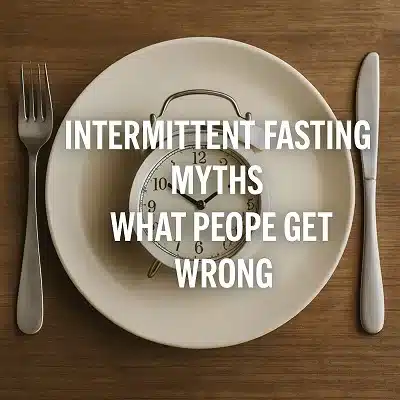Intermittent fasting has exploded in popularity over the last few years — and for good reason.
Done right, it taps into our primal biology, encouraging fat burning, better energy, and a sharper mind.
But like anything that gets trendy, intermittent fasting (IF) has also attracted its fair share of myths, misunderstandings, and downright bad advice.
If you’ve been on the fence about trying it — or if you’ve tried and struggled — chances are you’re bumping up against some of these common myths.
Let’s clear the air.
Myth #1: Fasting Means Starving Yourself
One of the biggest fears around intermittent fasting is that you’ll be miserable, weak, and hungry all the time.
Not true.
This isn’t starvation.
It’s simply choosing to eat during specific windows of time and allowing your body to rest and repair during the others.
Think about it: our primal ancestors weren’t snacking every two hours. They thrived on feast and fast cycles — it’s how we’re wired.
When you fast intelligently, hunger actually decreases over time as your body adapts to burning fat for fuel instead of constantly craving quick carbs.
Bottom line:
Fasting is about regaining control over hunger, not suffering through it.
Myth #2: You Have to Fast for 16+ Hours Every Day
The “16/8” method (16 hours fasting, 8 hours eating) gets tossed around like it’s the gold standard.
But here’s the truth: there’s no one-size-fits-all fasting window.
Some people thrive with 16/8. Others do better with a 14/10 schedule. Some might only fast a couple of days per week.
It depends on your goals, lifestyle, and how your body responds.
Starting smaller — even 12 hours overnight — can offer real benefits and ease you into the rhythm without shocking your system.
Bottom line:
Find the rhythm that fits your body, not some rigid internet template.
Myth #3: Fasting Slows Down Your Metabolism
This one’s been around forever — and it’s flat-out wrong (unless you’re fasting for several days straight).
Short-term fasting — 12 to 24 hours — can actually boost metabolism slightly by increasing norepinephrine (a fat-burning hormone).
Studies show that metabolism stays stable or even revs up during short fasts.
What actually hurts your metabolism?
Chronically undereating, extreme calorie restriction, and yo-yo dieting. Not smart, sustainable fasting.
Bottom line:
You want to smartly support, not sabotages, your metabolic health.
Myth #4: Fasting is Only About Weight Loss
Sure, intermittent fasting can help shed fat.
But the benefits run way deeper than the number on the scale.
-
Increased insulin sensitivity
-
Reduced inflammation
-
Enhanced autophagy (your body’s natural clean-up process)
-
Mental clarity and focus
For many, the mental and energy benefits alone make fasting worth it — long after weight goals are met.
Bottom line:
Think of fasting as a health upgrade, not just a diet trick.
Final Thoughts
Intermittent fasting isn’t magic — and it isn’t misery.
It’s a return to a more natural eating rhythm that can help your body run the way it’s designed to.
Ignore the noise, trust your instincts, and experiment.
Maybe that’s a daily 14-hour fast. Maybe it’s an occasional 24-hour fast when it feels right.
Your body will tell you what works — if you’re willing to listen.
Stay motivated, stay patient — and embrace the freedom fasting can offer.

